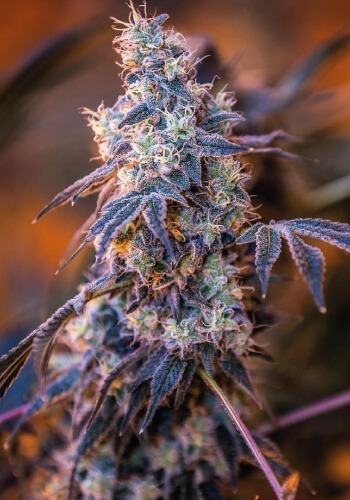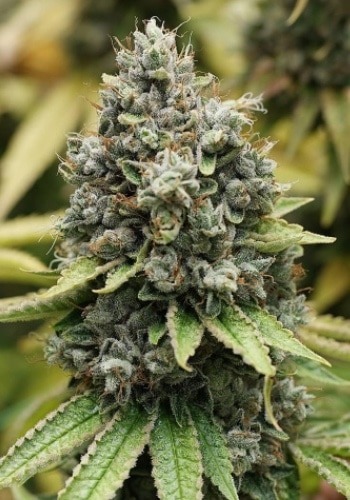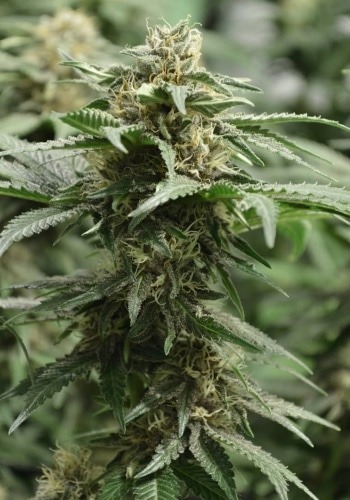A simplified summary of THCA
For the full and scientific summary, scroll down.
THCA (Δ-9-tetrahydrocannabinolic acid) is the starting point for THC (Δ-9-tetrahydrocannabinol). This means that when THCA is exposed to heat (decarboxylation), oxygen (drying/curing) or UV light, it transforms (biosynthesizes) from a non-psychoactive compound into the psychoactive cannabinoid THC. Before harvest, THCA is the most abundant cannabinoid that can be found in the cannabis plant and acts as a defensive mechanism against predatory insects, but it also plays a role in the plant’s growth cycle.
THCA: What it was and what it can be
When the harvested flowers of the cannabis plant are cured or stored too long, the THCA will slowly convert into CBN. THCA itself is a product of CBGA (Cannabigerolic acid), which is the ‘godfather compound’ from which all other cannabinoids are derived.
Medicinal benefits of THCA
The few studies that have been done on THCA suggest that it may be medically beneficial in the following ways:
- THCA helps to reduce nausea and pain.
- THCA seems to prevent and reduce inflammation (anti-inflammatory).
- THCA appears to have a positive effect on the immune system (immunomodulatory).
- THCA, just like THC, seems to have the ability to protect your nerve cells from damage and helps to keep your cells healthier and in good working order.
- THCA is believed to reduce convulsions and spasms.
Some studies even suggest that THCA may be used as a medicine for cancer, in the near future.
THCA performs better through the Entourage Effect with terpenes
If you wish to use THCA for medicinal purposes, it is recommended to consume raw cannabis flowers and leaves, without curing or heating the plant material. Even better would be to choose a strain that also has a high amount of the terpene Caryophyllene-Oxide, as that terpene boosts the effect of THCA through what we call the entourage effect.
A scientific summary of THCA
THCA is the precursor of Δ-9-tetrahydrocannabinol (THC), the main psychoactive compound in found in the cannabis plant and is typically the most abundant cannabinoid produced in raw and live cannabis. (dried cannabis contains approximately 15-25% of THCA)
THCA is responsible for 90% of the plant’s THC levels
THCA is biosynthesized (1) from another cannabinoid acid (called cannabigerolic acid or CBGa) and accumulates in the trichomes of the flowers and leaves, where it represents up to 90% of the total THC.
THCA is converted to THC during storage, fermentation, and can further degrade to form cannabinol (CBN) by the influence of auto-oxidation, high temperature and UV light. Conversion to THC can rapidly occur during heating (decarboxylation). However, this conversion is only partial . The amount of THCA converted into THC is highly depended on the temperature it is exposed to.
Medicinal benefits of THCA
Contrary to THC, THCA does not elicit psychoactive effects. Some studies suggest that THCA acts as potential anti-inflammatory, immunomodulatory (2), neuroprotective (3), and anticancer agent. It has also been shown to possess anti-convulsant activity with epileptic patients.
This compound exerts its pharmacological actions by engaging and activating type-1 cannabinoid receptors (CB1) in the Central Nervous System (CNS). THCA is also able to induce cell death in both cannabis- and insect cells, suggesting a role in the plant’s lifecycle, as well as defending the plant against predators. This property is potentiated by the effect of the terpene Caryophyllene Oxide (entourage effect).
Medical use of raw, unheated cannabis preparations (rich with THCA) may, potentially, allow patients to maximize the therapeutic gain for the treatment of several conditions, such as chemotherapy-induced nausea, pain, inflammation and muscle spasticity, while limiting the psychoactive side effects of THC.


